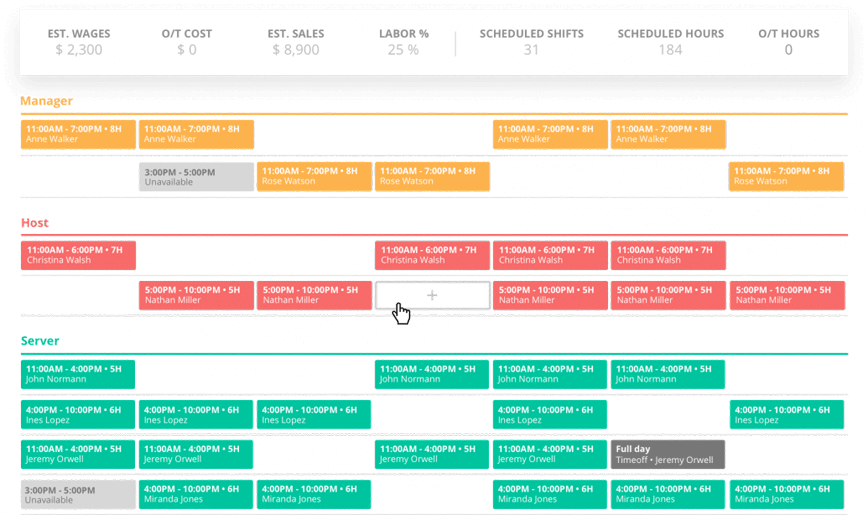The Importance Of Integrity In The Workplace And How To Improve It
When integrity in the workplace is low, your team will feel it. They’ll suffer...

The writer and philosopher Aldous Huxley is credited with saying,
“There is only one corner of the universe you can be certain of improving, and that’s your own self.”
Granted, he probably didn’t have essential qualities of a manager in mind when he said it, but the principle still applies.
Improving your corner of the universe (your own self) can take many forms — physical, mental, emotional, and social. And whatever qualities you choose to work on will have a profound effect on your ability as a manager.
But the real power of Huxley’s maxim resides in the fact that your corner of the universe influences every other corner of the universe. This means that, as a manager, your actions and behaviors can pull your team members in a given direction. Will you pull them up to success, or down to mediocrity?
Effective managers strive for the former; they labor to improve and inspire those around them to improve as well. It all boils down to a simple mantra that every successful manager should live by: Always be improving.
As salient as that advice is, improving your skills as a manager is infinitely easier said than done. Where do you start? What skills and qualities will have the most impact on you and your employees?
The experts at Sling will answer those questions in this article. Along the way, we’ll reveal 19 essential qualities that every successful manager should have. As you read, be honest with yourself. And if you find that you’re lacking in some area, get busy improving.
First, though, we’ll discuss manager duties. Think of these duties as the big picture and the qualities of a manager as the skills necessary to do those duties well. If you don’t understand and master both aspects of the manager’s job, guiding your business to success will be much more difficult.
Every business is different, so your particular manager duties may vary slightly. But, by and large, these responsibilities are the foundation in most industries.
On the surface, those responsibilities may appear to be all about you. But being a successful manager isn’t about your performance — it’s about your team’s performance. When you leverage your skill and ability in these fundamental duties, your team will thrive.
In a nutshell, that’s the guiding principle that every manager should abide by: do the basics well to give yourself, your team, and your business every chance to succeed.
Here are 19 personal qualities of a manager on which you can work to improve your job performance.

An effective manager is a focused manager. Focus manifests as ruthless attention to what is most important. Successful managers don’t allow minor details or tasks to distract them and their team members from the project at hand. Focus makes it possible for managers and teams to get everything done on time and to the highest standards possible.
Honesty is one of the key qualities of a manager. Your team needs to grow and improve, and the only way you can make that possible is if you’re honest with them all the time. Make it a point to tell your employees what they need to hear, not just what they want to hear.
If your staff did a good job but a specific component could have been better, tell them. Don’t just placate them with meaningless “attaboys” and move on. Be honest, call them out, and push them to find ways to improve the next time around.
Accountability means taking responsibility for your work and the work of your team members. Being accountable is easy when the job is going well. But the real test comes when the job is going badly.
That’s when an effective manager steps up, takes responsibility for the failures, and inspires employees to fix them.

Being a manager is synonymous with making decisions — you can’t have one without the other. Successful managers are comfortable making decisions with plenty of information and time, or with none at all.
Don’t be afraid to make a call based on what you think is best. If it doesn’t work out, learn from your mistakes and do better the next time.
What does it mean to be emotionally intelligent? It means that you lead with understanding. Every one of your team members (even you) will go through personal and professional struggles that will impact their work for better or worse.
Your job is to give compassion when necessary, and then to keep that compassion from affecting the overall quality of the work.
If you want to inspire a positive attitude in your team members, you need to first exhibit a positive attitude yourself. Don’t complain about projects that need to be done. Rather, be excited about the prospect of finding new and unique solutions and completing everything before the deadline. That positive attitude will rub off on your employees and motivate them to greatness.

Effective managers understand that company culture goes a long way toward making their team the best it can be. Instead of focusing on products and services, invest your energy into the unique qualities that your business has to offer. Make those qualities the focus of your company culture, and always be on the lookout for ways to make them better.
For all intents and purposes, you are the captain of the ship. At some point, your crew is going to come to you for guidance and direction. How will they be received? Will you be gruff and dismissive? Or will you be open and approachable?
The manager that exhibits the latter qualities — even when they’re already busy — is the one that builds loyalty and goodwill among all team members. Try to make time to devote your full attention to an employee who comes to you with a question or problem.
If you just can’t be interrupted at the moment, make an appointment to talk. Then reassure them that what they have to say is important to you.
Caring may be the last quality you would expect from a successful manager, but business is all about people. And whether the “people” in question are customers, clients, or team members, everyone responds better when they feel cared for.
Make sure you have the wellbeing of your employees in mind at all times and communicate that caring attitude to them as often as possible. When you can do that, everyone will stay positive and work together better.
Patience is both an art and a skill that can take years to perfect. If patience is one of the qualities of a manager that you need to improve, try taking four deep breaths when you feel yourself starting to lose your cool.
If you’re already a patient person, improve that quality even more by becoming aware of how you react under certain circumstances. Do you assess the situation calmly or act on the impulse to get involved? It may be better to stand back for a while and see how everything plays out.
Don’t expect all your employees to respond to a one-size-fits-all management style. What works for one employee might not work for another. You need to have the ability to adapt your management techniques to the individual rather than the group.
When you can do this, you can inspire everyone to succeed.

Many people consider caring and sympathy as the same thing. But sympathy is feelings of pity and sorrow for someone else’s misfortune (after something unexpected happens). Caring, on the other hand, exists as a general concern for wellbeing before and after unfortunate events occur.
As a manager, it’s vital to exercise sympathy in your day-to-day interactions with your team members. Everyone has personal issues that may, at times, affect the way they work. Sympathy allows you to “cut them some slack” until those personal issues subside.
When you exercise sympathy with your team members, they’ll see you as an understanding person who really cares about them. As a result, they’ll draw closer to you — and closer to each other — which will improve their productivity and cohesion.
Sympathy, however, should not be confused with empathy — the capacity or ability to imagine oneself in the situation of another, experiencing the emotions, ideas, or opinions of that person.
In some cases, you may be able to empathize with your team members, but in other cases, all you can do is sympathize. The distinction may be blurry, but here’s an example to help you understand:
As a male manager, you can never fully understand what a pregnant team member is going through. You can have sympathy for the difficulties she’s experiencing, but you can never truly empathize with her. A female manager, on the other hand, who has been through the joys and pains of childbirth is able to empathize and sympathize with the pregnant team member.
Regardless of which word you use to refer to the idea of exercising fellow feeling, showing compassion to your team will improve the way they work.
Integrity is the quality of having strong moral principles and exercising them in everything you do. Integrity is often most obvious in how you and your team choose to embody the ethics of your business culture.
Striving for excellence, accountability, and cooperation when no one is watching it the essence of integrity.
When you do your best to exhibit integrity in all you do, you lead by example and your team will notice. They’ll quickly learn that they need to exercise integrity — even when you’re not watching — to be successful at their job.
Integrity is often equated with honesty, but you’ll notice that they’re separate entries on this list. That’s because the two, though related, are fundamentally different.
Honesty is truthfulness. Integrity is adherence to moral principles. You can be honest — speak truth at all times — and still not live by certain moral principles. But if you strive for integrity, honesty will follow.
Trust is critical for the smooth operation and success of your team and your business. You have to trust that your team members:
And you have to trust that they will do all of these things without you looking over their shoulder all the time.
As a manager, you must delegate tasks and responsibilities if you hope to get anything accomplished. You have to realize that you can’t do it all. That takes trust. Trust in your team, trust in yourself, and trust in your ability to lead effectively.
What’s more, trust is a two-way street that requires time to build. You need to trust your employees and they need to trust you. That doesn’t happen in a day or even a week. You build trust by repeatedly — over many weeks — demonstrating that you have your employees’ best interest, and the interest of your business, at heart.

To be a successful manager, you have to be a good communicator. This quality of a manager encompasses more than just the words you say. It includes:
Many managers equate good communication with lengthy explanations. But effective communication is more about clarity and brevity than using a lot of words to convey what you’re trying to say.
A manager who wants to communicate well will be as clear and succinct as possible in what they say and take the time to make sure that everyone understands.
Unlike “hard” skills like organization and competence that you can measure, good judgment is more of a “soft” skill that relies on synthesizing a wide range of information and experience.
Judgment is defined as the ability to make decisions or form an opinion objectively, authoritatively, and wisely. Though you can improve your judgment with practice, the foundation of this quality of a manager includes:
At first, good judgment is often the byproduct of your unconscious mind. You may have a gut feeling based on the sensory signals listed above. Before you dismiss that “intuition,” examine it logically and try to figure out why you’re feeling that way. Then use that feeling make a conscious decision.
With practice, you’ll be able to exercise good judgment without relying on your unconscious mind to tell you how you feel. You’ll be able to examine the situation objectively and come to a conclusion.

The ability to listen is one of the qualities of a manager that you should never neglect. We do, after all, have two ears but only one mouth. Whether you’re in a team meeting or a one-on-one review, the bulk of your activity should be listening rather than talking.
The easiest way to improve this skill is to really listen to what your team members say without interrupting. Formulate a response based on the information they’ve conveyed. Then, before you speak, think about what you want to say and how you want to say it.
Yes, this active “listen-and-respond” habit isn’t always easy — especially when stress levels are high — but, with practice, you’ll notice a marked improvement in how you communicate with your team members and how they communicate with you.
If you want to lead effectively — and have your team members follow — you need to be competent in every aspect of your job.
That doesn’t mean you have to be an expert, but you should at least have a healthy knowledge of how to be efficient and successful in everything you do… and everything you ask your team members to do.
When you’re competent in your business and exercise as many qualities of a manager as possible, your team members will follow your example — not because they have to, but because they want to.
As a manager, not only do you have to keep yourself organized, but you also have to keep your team members organized and on-task. Nowhere is that more obvious than in the scheduling process. There are so many variables to keep track of and so many different tasks to be done that figuring out who works when in even the simplest of schedules may seem like a Sisyphean nightmare.
Thankfully, improving your organization doesn’t take near as much time as some of the other qualities on this list. That’s because Sling has created an app that automates, simplifies, and streamlines many of the variables that make scheduling such a chore.

Sling’s intuitive and well-organized user interface gives you all the tools you need to bring order to the chaos. With just a few clicks of the mouse or taps on the screen, you can create clear, easy-to-read schedules in just a matter of minutes.
After that, Sling’s cloud-based platform makes it easy to distribute the schedule to all your team members simultaneously. Simply send them the link and give them permission to view or make changes. Then they can log in to Sling on their phone, home computer, or mobile device to view their schedule anytime, anywhere.
But the benefits don’t end there. Sling provides a central location where team members can go to indicate when they can work and to request time off. Sling then reminds you about such variables as unavailability, double-bookings, and time-off requests while you’re creating the schedule. Sling also gives you other powerful features like:

All of those features reduce the time it takes to organize employees effectively. Sling helps managers bring teams together, keep everyone engaged, and build a stronger company culture. That means success on many different levels — for you and your team.
Improve your organization skills by using Sling for all your scheduling needs. It only takes a few minutes to get started. After that, you can check organization off your list and spend time improving the other essential qualities of a successful manager.
For more on scheduling and management techniques, and to try Sling for free, visit GetSling.com today.
See Here For Last Updated Dates: Link
This content is for informational purposes and is not intended as legal, tax, HR, or any other professional advice. Please contact an attorney or other professional for specific advice.
Schedule faster, communicate better, get things done.